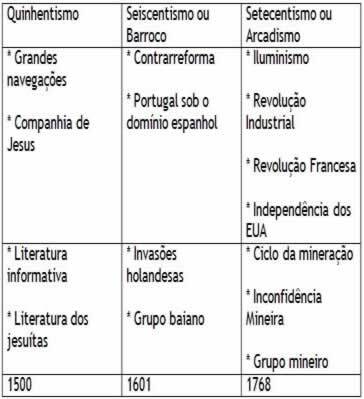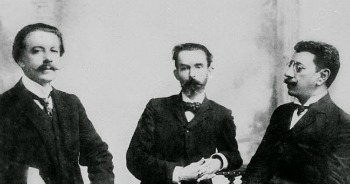idactically saying, in the study of Literature we understand that all artistic manifestations belonged to a given literary school, also called period styles. Based on this principle, our purpose is to make you familiar with the guiding features of these styles (or, if you prefer, of these literary schools), in order to understand in a meaningful way some of them, such like the Baroque, Arcadianism, Romanticism, among others, of which we are already aware.
All representatives of the artistic scene, Brazilian or not, lived outside a certain time, of a certain time and had the privilege of experiencing the events, the facts manifested in the political, economic and social plan of the time in question. Given these assumptions, it would not be possible to speak of the Renaissance without mentioning the crisis of feudalism; make reference to Romanticism without remembering the French Revolution; mention Realism without contextualizing the Industrial Revolution, and so on. In this way, the characteristics demarcated in the
subjectivism of the romantics, in the social ideology printed in the vision of writers of the realist period, etc.We understand, therefore, that everything that was seen by us was generically characterized as the result of a certain reality, both in terms of the plan. formal (generally manifested in poetic creations) and with regard to the plane of ideas (manifested in creations in the form of prose) of the discourse in themselves. Following this line of reasoning, this whole scenario served only as a backdrop for artists could expose their positions, their ideological vision of reality surrounding.
It is worth mentioning that even with a given period as support, each writer was recognized for his own style, for a way individual to compose the creations, even because the unique character of the human being does not let go of issues related to aspects of this nature. Thus, the form that a given artist gives to a given theme is never the same as another would. Therefore, in order to support the statement that we are now making, let us see what the poet Manuel Bandeira reveals:
Style is not the embellishment: style is born from the writer's own character and is the mark of his personality.
Through the elucidations mentioned here, it is interesting to check a little more about the periodization of Brazilian literature, emphasizing the demarcations printed in these period styles, portrayed through the panoramic frames below, in view of the world scene, added to the Brazilian:
Brazilian historical-literary panel
Do not stop now... There's more after the advertising ;)
colonial era

national era

Source (table): DE NICOLA, José. Literature panel in Portuguese language: theory and styles of the times of Brazil and Portugal. São Paulo: Scipione, 2006
*FLAG, Manuel. Complete poetry and prose. 4th ed. Rio de Janeiro: Nova Aguilar, 1985.
By Vânia Duarte
Graduated in Letters
Would you like to reference this text in a school or academic work? Look:
DUARTE, Vânia Maria do Nascimento. "Epochal Styles"; Brazil School. Available in: https://brasilescola.uol.com.br/literatura/estilos-epoca.htm. Accessed on July 27, 2021.

